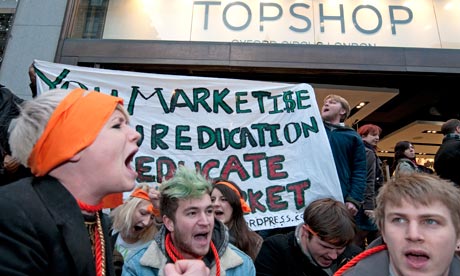The largest of this month's three protests against education cuts is expected as thousands sign up for direct action around the UK

By this evening, over 5,500 people had signed up for a day of direct action in London alone, where the national campaign against fees and cuts has organised a march on parliament, and where last week thousands of school pupils and students were "kettled" by police for several hours.
Over the weekend NUS president Aaron Porter apologised for his "spineless" lack of public support for last week's demonstration, when tens of thousands of students walked out of lessons, but today's protests will have NUS backing.On the nationwide Facebook page for the demonstrations, over 24,000 students had indicated they would be protesting across the UK tomorrow. "Direct action", ranging from walking out of lessons to rallies is expected in over 40 towns and cities, with crowds of around 2,000 expected in Manchester, Bristol and Brighton.
Some 32 universities are still being occupied following last Wednesday's protests, with most planning to keep a small group in the seized buildings while fellow students march. Around 60-70 occupants from Newcastle University intend to join students and pupils from local sixth form and further education colleges on a marching through the city centre, with some 1,700 had signed up to the Facebook page for the event yesterday, with the demonstration planned to culminate in a mass snowball fight.
Hundreds of students occupying the administrative headquarters of Cambridge University were issued with a possession order this evening, which could force them to leave the building. Talks were in progress last night, as the students planned to meet with cohorts and around 900 school pupils near the university today to march through the city in protest against cuts. Students occupying Appleton Tower at Edinburgh University said they would be joined by school and college pupils for a march from Bristo Square to the Scottish parliament at Holyrood, with "hundreds" expected to join the protest.
Last week's demonstrations were noted for the large number of school and college pupils – some as young as 14 – who walked out of lessons to take part. Some estimates put the total number of protesters in the UK at 130,000.
While the protests were mainly peaceful, the London demonstrations saw a police van vandalised after thousands of students were 'kettled' by police on Whitehall, in central London, and later protesters were subjected to repeated charges by officers on horseback.
An NUS-organised protest against increases in tuition fees two weeks earlier saw a minority of protesters break into the Conservative Party's headquarters at 30 Millbank.
Simon Hardy from the national campaign against fees and cuts, said he met with the Metropolitan police today[mon] to discuss plans for the protest. Thousands of students are expected to gather in Trafalgar Square before marching on Parliament, where they will hold a rally. "What I'm concerned about is overreactions by the police," Hardy said.
"It's the position of the National Campaign against fees and cuts that there has been no violence from the protesters. "There's been vandalism, that's true, smashing a police van and smashing the Tory Party HQ windows, but the violence has overwhelmingly come from the police – there was batoning of students, there was a horse charge on Whitehall on the 24th.
"We're going to have stewarding to keep ourselves safe and maintain our right to protests, and we're not going to accept violence from the police as they try to intimidate people or to bully or harrass them, which is effectively what the actions were on Whitehall on the 24th."A spokeswoman for the Metropolitan police said there had been a lack of communication ahead of last Wednesday's protest, but insisted police were "more than happy to allow peaceful protests".
"As regards our tactics and the actual plan itself, the plan is flexible and its adaptable to what happens on the ground," she said.
"Containment remains a tactic that is open to us. We only use it if its appropriate and if its proportionate to what's going on on the ground.
"While we hope we don't have to use it, if the circumstances happen we may again have to consider it and use it."
But the head of the Metropolitan police's public order branch, Commander Bob Broadhurst, warned: "Schoolchildren have as much right as anyone else to protest, but young people are more vulnerable and likely to be injured if violence breaks out.
"We would ask parents to talk to their children and make sure they're aware of the potential dangers, as there is only so much police officers can do once they are in a crowd of thousands."
No comments:
Post a Comment